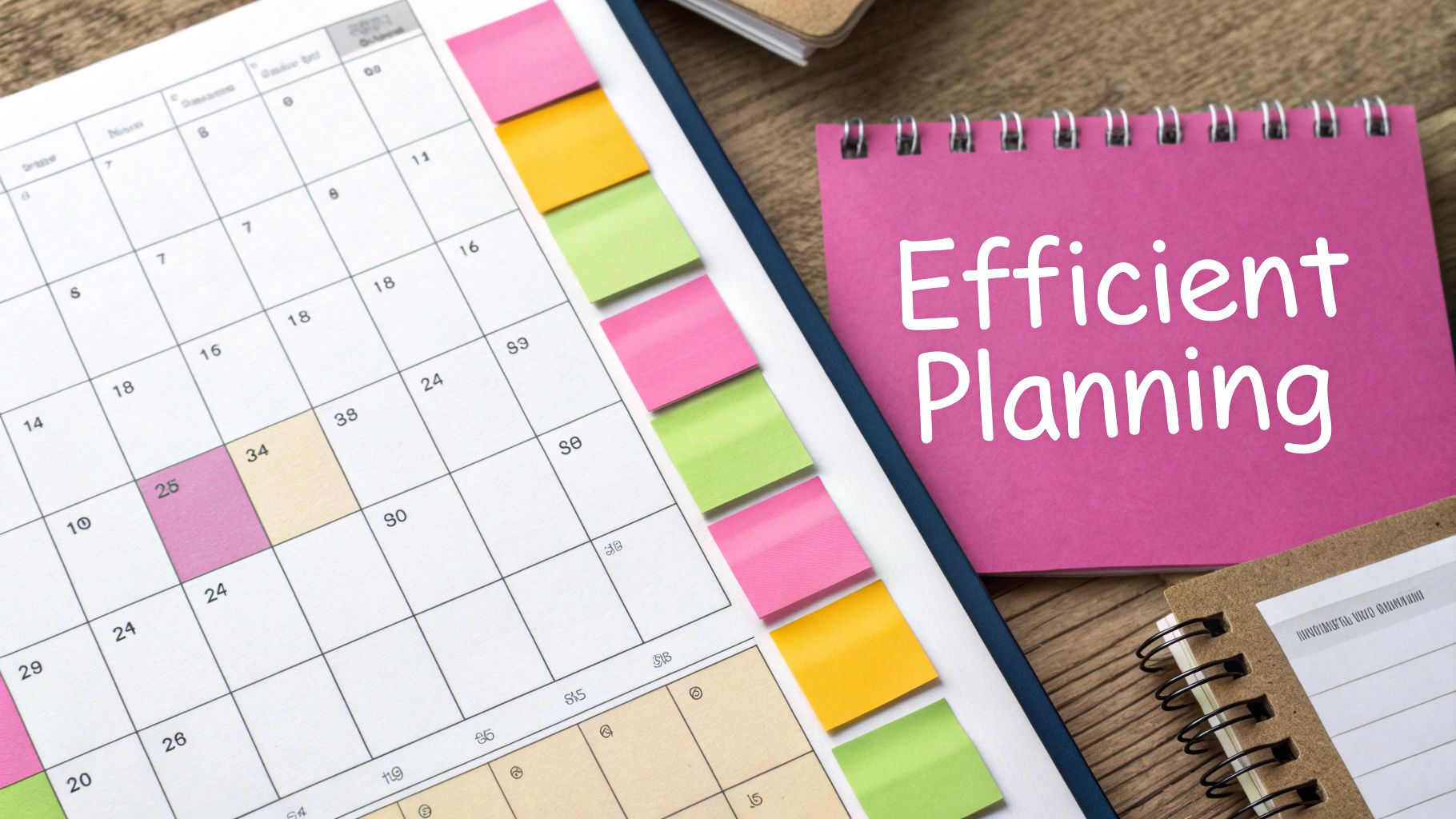
15 Best Ways to Study for Finals: The Science-Backed Methods That Actually Work
Understanding Your Brain's Learning Superpowers

Finals week can be mentally exhausting, but understanding how your brain learns can help you study more effectively. Rather than relying on last-minute cramming, you can tap into your brain's natural learning abilities to master the material. Let's explore some key principles that will help you study smarter for finals.
The Power of Active Recall
One of the most effective study techniques isn't just reading over your notes – it's actively trying to remember the information. Think about how you build physical strength through exercise. Similarly, your brain gets stronger when you practice retrieving information from memory. For instance, instead of simply reviewing flashcards, try writing down everything you can remember about a topic before checking your notes. This mental workout helps cement the information in your memory while showing you what concepts need more review.
Spaced Repetition: The Key to Long-Term Retention
Going hand-in-hand with active recall is spaced repetition – reviewing material at gradually increasing intervals. This method works because it makes your brain work a bit harder to retrieve the information each time, which actually improves long-term memory. Consider how you might learn a new language. Studying vocabulary for short sessions each day and reviewing words after one day, then three days, then a week is much more effective than trying to memorize everything at once. This same principle works for any subject you're studying.
Connecting the Dots: Building Knowledge Networks
Your brain excels at making connections between ideas rather than memorizing isolated facts. When you actively link new concepts to information you already know, you create a web of understanding that makes both recall and application easier. For example, in statistics, seeing how different formulas relate to each other helps you grasp the bigger picture and tackle problems more strategically. Creating mind maps or diagrams can help you visualize these relationships and strengthen your overall comprehension.
Practice Makes Perfect: The Importance of Applied Learning
Finally, remember that real learning happens through practice and application. Working through sample problems and exercises helps reinforce your understanding while revealing areas that need more work. This is especially crucial for subjects like math and science, where you need to apply formulas in different situations. Just like learning an instrument requires regular practice beyond just reading music theory, mastering academic subjects requires hands-on practice with the material. The more you work with concepts actively, the better prepared you'll be to handle exam questions with confidence.
Building Your Strategic Study Timeline
A well-planned study strategy is crucial for success during finals. Just as athletes train methodically for a marathon, effective studying requires breaking down material into manageable segments over time. Here's how to create a study plan that will help you perform your best.
Identifying Peak Productivity
Understanding when you naturally focus best is the first step in creating your study schedule. Pay attention to whether you concentrate better in the morning or evening, and if you work better in short bursts or extended periods. When you identify your peak productivity hours, you can schedule challenging subjects during those optimal times. For example, tackling complex math problems during your most alert hours will lead to better comprehension and retention.
Allocating Study Blocks Effectively
After determining your peak study times, structure your study blocks strategically. Rather than attempting to review an entire semester at once, break subjects into focused topics. Instead of marathoning through statistics, dedicate specific sessions to concepts like hypothesis testing. This focused approach makes material more digestible and learning more effective. Mix up subjects to maintain engagement – switching between different topics, like moving from statistics to history, helps prevent mental fatigue while keeping productivity high.
The Importance of Strategic Breaks
Taking proper breaks is just as important as dedicated study time. Research shows that brief 5-10 minute breaks every hour significantly boost both focus and information retention. Make these breaks count by stepping away from screens – take a short walk, listen to music, or do some light stretching. This gives your brain valuable processing time, similar to rest intervals during exercise that allow for better performance during active periods.
Building Your Personalized Timeline
Creating your study timeline requires customization since everyone learns differently. Use whatever planning tool works best for you – whether that's a paper planner, digital calendar, or specialized study app. Map out specific time blocks for each subject based on your peak productivity patterns and planned breaks. For instance, you might schedule statistics for morning sessions, history for afternoons, and lighter review in evenings. Build in flexibility for unexpected events or topics that need extra attention. This proactive approach helps reduce stress as finals approach while developing strong study habits that will serve you throughout your academic career.
Remember – the goal is steady progress over time, not last-minute cramming. When you implement these practical strategies consistently, you'll be thoroughly prepared for finals while maintaining balance in your daily routine.
Mastering Active Recall Techniques

Active recall turns passive reviewing into real learning by making your brain work to retrieve information. Instead of simply rereading notes, you engage directly with the material, strengthening your understanding and memory. Let's explore specific techniques to make active recall work for your finals preparation.
Creating Effective Question Banks
The key to active recall is asking the right questions. Rather than surface-level queries like "What's the formula for X?", craft questions that test deeper understanding. For instance, ask "How would you explain this concept to someone else?" or "What real-world problems can this solve?" These questions push you to think critically and explain ideas in your own words, cementing your grasp of the material.
The Power of Spaced Repetition Systems
Combining active recall with spaced repetition creates a powerful learning system. Think of it like building muscle memory – each review strengthens your recall, especially when timed strategically. Start with daily reviews of new material, then gradually increase the gaps between practice sessions. This approach works particularly well for memorizing formulas, definitions, and core concepts that you'll need quick access to during exams.
Testing Yourself Effectively
Regular self-testing reveals what you truly know versus what just feels familiar. Close your notes and try explaining key concepts out loud, solving practice problems, or teaching the material to others. This process quickly shows which topics need more attention. Like practicing an instrument, you can't truly master the material until you can perform without looking at the sheet music.
Memory Triggers and Comprehensive Understanding
Create personal connections to make concepts stick. This might mean developing memorable acronyms, drawing simple diagrams, or linking ideas to familiar experiences. The goal is building a network of connected knowledge, not isolated facts. Keep asking yourself questions like "How does this relate to other topics?" and "Why is this important?" This builds the kind of deep understanding that helps you handle unexpected exam questions.
Building Your Active Recall System
Design a personalized active recall practice that fits your learning style:
- Identify Key Concepts: Map out the essential ideas you need to master
- Generate Questions: Create questions that push you to explain and apply concepts
- Schedule Reviews: Set up a structured review calendar using flashcards or study apps
- Vary Your Techniques: Switch between different practice methods to stay engaged
- Track Your Progress: Note which topics need more work and adjust your approach
Following these strategies transforms basic studying into active learning that prepares you thoroughly for finals. The effort you put into active recall pays off in deeper understanding and better exam performance.
Creating Knowledge Networks That Last

Success in finals requires more than just memorizing facts – you need to build lasting connections between concepts. Think of your knowledge like building a house: individual facts are the bricks, but you need strong connections and an overall framework to make them meaningful. Let's explore proven ways to create knowledge networks that stick with you long after exams are over.
Mapping Relationships Between Concepts
The key to deep understanding is seeing how different ideas connect and influence each other. Rather than studying topics in isolation, look for meaningful relationships between them. In history, for example, understanding how economic factors led to political changes helps you grasp both topics more fully. You can map these connections visually using tools like mind maps and diagrams, making the relationships concrete and memorable.
Creating Powerful Visual Summaries
Visual summaries do more than organize information – they give you a big-picture view that makes complex topics click. When you create a timeline of historical events or diagram the steps of a chemical reaction, you build a mental model that's easy to recall during exams. For instance, making a flowchart of statistical methods helps you quickly choose the right approach for different problems. These visual tools make information stick and help you see patterns you might miss otherwise.
Explaining Concepts in Your Own Words
One of the best ways to cement your understanding is explaining ideas to others, even if just to yourself. When you put concepts into your own words, you have to organize the information clearly and identify the key points. The process of explaining reveals any gaps in your knowledge so you can fill them before the exam. Try explaining a statistical concept to a friend – you'll quickly spot areas that need more review. This active approach beats passive re-reading every time.
Connecting Ideas Across Different Subjects
While each course has its own content, many fundamental concepts and principles show up across different subjects. Recognizing these common threads helps you understand each topic better and builds critical thinking skills you can apply broadly. For example, the logical reasoning used in philosophy courses often applies directly to solving math problems. Making these cross-subject connections helps you see how knowledge fits together in the real world, where problems rarely stick to just one field. This integrated understanding lets you approach exam questions with deeper insight and apply what you know in new ways.
Developing Your Perfect Practice Strategy
While building knowledge networks and practicing active recall creates a strong foundation, achieving your best performance on finals requires a well-designed practice approach. Simply reviewing notes isn't enough – you need to actively engage with the material in ways that match how you'll be tested. Let's explore how top students structure their practice sessions, so you can refine your own study methods for optimal results.
Identifying Your Knowledge Gaps
Before jumping into practice problems, take time to honestly assess where you need the most work. Think of this like a sports team reviewing game footage – understanding weak spots helps focus training on what will drive the biggest improvements. Try taking practice quizzes without referring to your notes to reveal not just what concepts you're missing, but why you're struggling with them. For instance, if you keep making calculation errors with statistics formulas, you know to prioritize working through practice problems rather than just re-reading formula definitions. This targeted self-assessment leads to much more effective studying than general review.
Strengthening Weak Areas With Targeted Exercises
Once you've pinpointed knowledge gaps, focus your practice time accordingly. Like a musician drilling a challenging passage until it becomes automatic, you need dedicated practice on your trouble spots. However, mindless repetition won't cut it – your practice needs clear purpose. If hypothesis testing in statistics trips you up, spend focused sessions working a variety of those problems specifically. Start with basic examples to build confidence, then progress to more complex scenarios. This systematic approach to addressing weaknesses is central to effective finals preparation.
Creating Realistic Practice Scenarios
Your practice should mirror actual exam conditions as closely as possible. Just as actors don't simply memorize lines but rehearse in full costume under stage lights, you need to simulate the real testing environment. Work through practice problems with the same time constraints and pressure you'll face during finals. For example, time yourself solving problems at the pace needed for the actual exam. This kind of authentic practice reduces test anxiety and builds the skills to perform well under pressure.
Managing Study Fatigue and Maintaining Focus
Long study sessions can mentally exhaust you and make learning harder. Taking strategic breaks becomes essential – research shows that short breaks each hour significantly boost focus and productivity. Skip social media during these breaks. Instead, go for a walk, listen to music, or do a brief meditation. Think of it like interval training – alternating focused work with rest periods. This rhythm keeps your mind fresh and helps you retain more material, while preventing burnout during intense finals preparation.
Customizing Your Finals Success Blueprint

Every student approaches learning differently. While there are proven study methods, the key is finding what genuinely works for you. Let's explore how to create a study plan that matches your personal style and helps you succeed during finals.
Understanding Your Learning Style
Before diving into specific techniques, take time to identify how you learn best. Visual learners often grasp concepts through diagrams, charts, and written notes. Auditory learners retain information better by listening and discussing. Hands-on learners need physical practice and real examples. For instance, if you're a visual learner, try making colorful mind maps. If you learn by listening, record key concepts and play them back during review sessions. Knowing your style helps you choose methods that stick.
Adapting Proven Methods
Common study techniques work well when adjusted for your needs. Take spaced repetition – you can apply it differently based on your subject. For history, create flashcards with important dates and review them at set intervals. For math, practice increasingly complex problems over several study sessions. This personal approach helps build real understanding, not just memorization.
Balancing Multiple Exams
Finals week requires juggling several subjects at once. Create a smart schedule based on exam difficulty, how much each test counts toward your grade, and which topics need the most work. For example, if chemistry is challenging but psychology comes easily, dedicate more practice time to chemistry while maintaining regular psychology reviews. This balanced strategy keeps you prepared across all subjects without getting burnt out.
Maintaining Motivation and Momentum
Studying for finals takes sustained effort over time. Set clear daily goals and break big topics into smaller, manageable pieces. Reward yourself for hitting milestones – maybe take a short walk after mastering a difficult concept. Just as you'd plan rest stops on a long drive, schedule regular breaks to stay fresh and focused. This approach helps maintain your drive and enthusiasm throughout the study period.
Building Your Personalized Study Plan
Your most effective study approach combines techniques that match your style and schedule. Mix active recall with spaced practice, adjust strategies for each subject, and plan breaks to stay sharp. Consider using a study planner to organize your schedule and track progress. A personalized plan that fits your needs will help you study efficiently and perform your best on exam day.
Ready to make your study sessions more effective? Notescast, the app that converts your notes into engaging videos, can help you reach your goals! Visit https://notescast.app/ today and find a better way to study.
